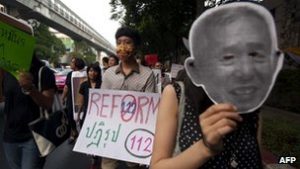Memo #193
By Kieran Bergmann – kieran.bergmann [at] utoronto.ca
 Laws meant to protect the monarchy from “defamation” are increasingly being used to suppress free speech and discussion of politics in Thailand, particularly on the Internet. In the last six years, there has been a surge in prosecution of these “lèse-majesté” cases – some estimated as high as 1,500 per cent.
Laws meant to protect the monarchy from “defamation” are increasingly being used to suppress free speech and discussion of politics in Thailand, particularly on the Internet. In the last six years, there has been a surge in prosecution of these “lèse-majesté” cases – some estimated as high as 1,500 per cent.
The government’s primary method of controlling cyberspace has been to prosecute “offenders” under the lèse-majesté provision in the criminal code, which prohibits any act considered defamatory to the monarchy, and the 2007 Computer Crimes Act. The use of these two legal instruments in conjunction has extended the criminalization of lèse-majesté into cyberspace and broadened the pool of potential lèse-majesté “criminals.”
In 2006, only 30 such charges were filed. In 2007, the year the Computer Crimes Act was adopted, 126 charges were filed. In 2010, a whopping 478 charges were filed. I found that the lack of clarity surrounding these laws and the very real threat of prosecution prompts many Thai commentators and editors to exercise self censorship.
When the current prime minister, Yingluck Shinawatra, was elected in July 2011, there was hope that the number of such charges would drop. Her Pheu Thai party maintains close ties with her brother, former prime minister Thaksin Shinawatra. He was deposed in the 2006 coup amidst accusations of criminal conduct, including charges of lèse-majesté. But the government has ramped up its efforts. Last December, a “war room” was established in police headquarters where technicians work around the clock to monitor web sites for lèse-majesté content.
Citizens are pushing back. In May, after a 62-year old man died a few months into his 20-year prison sentence for allegedly sending lèse-majesté text messages, hundreds of citizens protested outside the Bangkok Criminal Court demanding reform of these laws. In June, a petition proposing amendments to the lèse-majesté laws was submitted to parliament under Article 163 of the Constitution, which requires any proposed amendment to a law to be examined if at least 10,000 citizens sign a petition of support. Unfortunately the amendments were rejected. The struggle for control of cyberspace continues in Thailand.
About the Author:
Kieran Bergmann is the Google Policy Fellow at the Citizen Lab, Munk School of Global Affairs, University of Toronto. She previously worked at the Canadian Embassy to Thailand, Burma, Cambodia, and Laos.
Links:
- Extending Censorship Controls in Southeast Asia, The Asia Pacific Foundation of Canada, October 2012. (By Kieran Bergmann)
- Throttling Free Speech, at Home and Abroad, ipolitics, November 2012. (By Kieran Bergmann)
- Outsourcing Censorship, Canadian International Council, September 2012. (By Kieran Bergmann)
Related Memos:
- Our other Memos about Thailand
